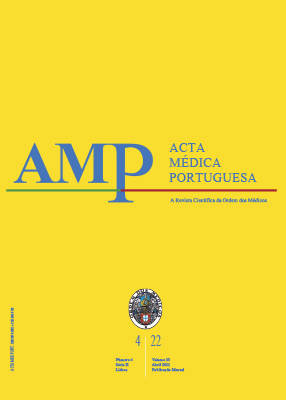Use of Cognitive Enhancers by Portuguese Medical Students: Do Academic Challenges Matter?
DOI:
https://doi.org/10.20344/amp.14220Keywords:
Academic Performance, Central Nervous System Stimulants, Portugal, Prescription Drug Misuse, Students, MedicalAbstract
Introduction: Nonmedical use of prescription drugs and other substances for cognitive enhancement in the academic environment has been documented in several studies. However, the prevalence among Portuguese university students is unknown. We aimed to assess the prevalence and academic contexts of the use of cognitive enhancers of a sample of Portuguese medical students.
Material and Methods: An online questionnaire about the use of cognitive enhancers was completed by 1156 participants, who were either medical students (group 1) or newly qualified physicians applying for the Portuguese medical licensing exam (group 2).
Results: Coffee was the most frequently used substance for cognitive enhancement purposes in both groups, whereas nonmedical use of prescription drugs for cognitive enhancement was lower in undergraduate students (5%) and higher in licensing exam applicants (14%). Methylphenidate (35%) and modafinil (10%) were the most consumed prescription substances and they were mainly used to enhance attention (83%) and memory (44%). Use of prescription drugs for cognitive enhancement was mainly associated with studying for medical school exams and the medical licensing exam. Most prescription drugs for cognitive enhancement were obtained through medical prescription (54%).
Discussion: These results show a low consumption of prescription drugs for cognitive enhancement by Portuguese medical students. Licensing exam applicants show a higher consumption of almost every substance included in this study, which might be explained by the crucial role of the exam in defining their future career path and desire by students to improve the cognitive skills that determine exam success.
Conclusion: Studying drugtaking behaviors in medical students and young doctors is relevant for public health and medical education, since they will soon be in charge of drugs prescription. Therefore, ethical and medical concerns raised by off label consumption of prescription drugs for cognitive enhancement purposes must be openly addressed.
Downloads
Downloads
Published
How to Cite
Issue
Section
License
Copyright (c) 2021 Acta Médica Portuguesa

This work is licensed under a Creative Commons Attribution-NonCommercial 4.0 International License.
All the articles published in the AMP are open access and comply with the requirements of funding agencies or academic institutions. The AMP is governed by the terms of the Creative Commons ‘Attribution – Non-Commercial Use - (CC-BY-NC)’ license, regarding the use by third parties.
It is the author’s responsibility to obtain approval for the reproduction of figures, tables, etc. from other publications.
Upon acceptance of an article for publication, the authors will be asked to complete the ICMJE “Copyright Liability and Copyright Sharing Statement “(http://www.actamedicaportuguesa.com/info/AMP-NormasPublicacao.pdf) and the “Declaration of Potential Conflicts of Interest” (http:// www.icmje.org/conflicts-of-interest). An e-mail will be sent to the corresponding author to acknowledge receipt of the manuscript.
After publication, the authors are authorised to make their articles available in repositories of their institutions of origin, as long as they always mention where they were published and according to the Creative Commons license.









